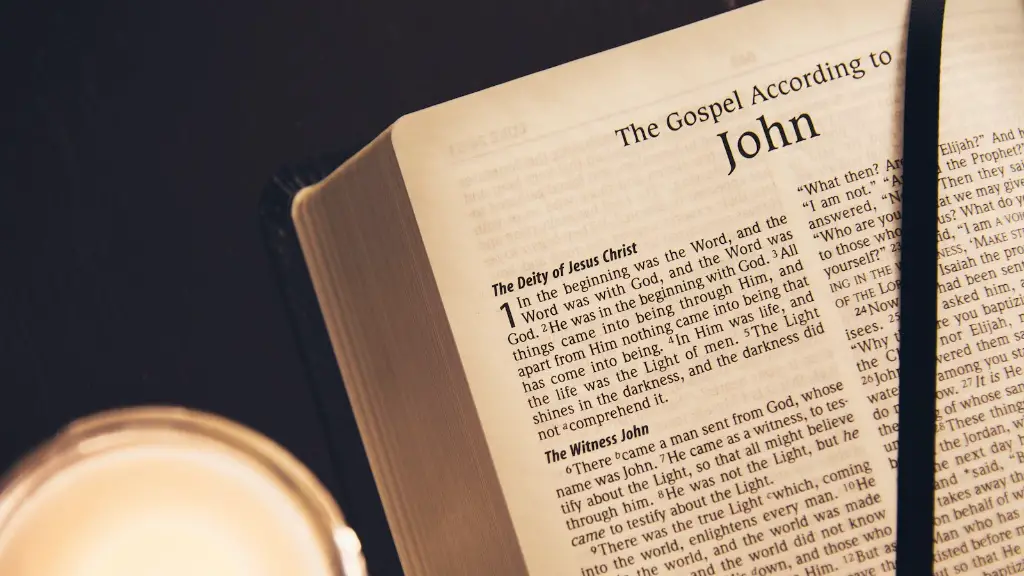The word “prodigal” is a term that most people have heard, but not everyone knows what it means. In the Bible, the word “prodigal” means “wasteful” and is associated with a person who is extravagant in their spending and unconcerned with the consequences of their actions. It refers to someone who is not content with the status quo and continually seeks more, regardless of the cost or consequences. Prodigal is also used to describe a person who has abandoned the teachings of the Bible, God, or another religious figure and has gone their own way.
The term “prodigal” is most often used in reference to the parable of The Prodigal Son that appears in the Bible. In this parable, Jesus tells the story of a young man who decides to leave his father’s house, squander his inheritance and succumb to a life of sin and excess. Yet despite the young man’s wrongdoings, his father still welcomes him home with open arms and forgiving heart. This story captures the essence of what it means to be prodigal: one who may stray from the way of the Lord, but is welcomed back with love and forgiveness.
The concept of prodigal is closely connected to the idea of mercy and grace. When someone goes astray and continues to make mistakes and demonstrate bad judgment, it takes a great measure of wisdom and understanding for others to show them mercy and grace. This quality of mercy and grace is closely tied to the story of The Prodigal Son and is something that appears throughout the Bible. While it is important to practice wisdom, it is also important to forgive, something that Jesus shows us in the parable.
Moreover, the significance of The Prodigal Son is seen in the fact that Jesus taught this parable in response to the question of who can be forgiven. Jesus essentially explains that anyone can be forgiven if they are willing to repent and change their ways. By using a story of a person becoming prodigal, Jesus shows that a life devoted to sin can be changed, no matter how long someone has been living in a way that is contrary to the teachings of the Bible.
In a broader context, the idea of prodigal is one that can be seen throughout the Bible and in the modern world. Prodigal behavior can be seen in many different societies, cultures, and religious denominations. It is a reminder that no matter how someone has acted in the past, it is possible to be forgiven and to start anew. This is a reminder that no one is too far gone and it is never too late to turn one’s life around.
What Leads People to Prodigal Behavior?
While it is difficult to pinpoint the exact cause of prodigal behavior, many have speculated that it is the result of growing up in an environment that isn’t conducive to spiritual growth. For example, some may come from a family background that doesn’t emphasize the importance of faith and worship, or one that places a heavy emphasis on wealth and success. With a lack of exposure to spiritual teachings and practices, individuals may be more likely to engage in prodigal behavior as they search for happiness and fulfillment.
In today’s society, the influence of technology and media can also play a role in leading an individual to prodigal behavior. Seeing examples of fame, wealth, and power in the media can lead someone to abandon their values and morals and focus on their own desires. Additionally, the combination of peer pressure, personal ambition, and exposure to popular culture can lead someone to become excessively focused on material things and losing sight of the spiritual aspects of life.
How Can People Avoid Prodigal Behavior?
Although it may be difficult, one of the best ways to avoid prodigal behavior is to stay connected to the teachings of the Bible and take part in spiritual practices such as prayer and Bible reading. This will help maintain an individual’s faith and provide an anchor point during times of struggle. Additionally, staying plugged into a community of faith and befriending those who have similar spiritual practices can offer support, accountability, and wisdom.
It is also important to stay aware of one’s thoughts, feelings, and emotions as they can give insight into potential prodigal behaviors. For example, noticing feelings of hopelessness or emptiness can indicate a need to pursue greater purpose and spiritual fulfillment. Additionally, becoming aware of emerging patterns of thought and behavior can help someone identify a potential prodigal problem before it becomes more serious.
What Are the Consequences of Prodigal Behavior?
The consequences of prodigal behavior can vary depending on the circumstances and the individual. On an immediate level, engaging in prodigal behavior can lead to broken relationships, missed opportunities, and even physical illness and injury. Over the long term, prodigal behavior can lead to greater emptiness, despair, and alienation, as an individual grows further separated from the teachings of the Bible.
In the case of The Prodigal Son, his behavior led to the squandering of his inheritance and the loss of his family’s fortune. This is an example of the financial and material consequences of engaging in prodigal behavior. Yet despite the physical and financial implications of his wrongdoings, his father still showed him mercy and forgiveness when he returned home.
What Is the Significance of the Parable of The Prodigal Son?
The story of The Prodigal Son is packed with spiritual meaning and has a powerful message for all people. Most significantly, the story demonstrates the power of mercy and grace. No matter how far someone may stray from the Lord and what mistakes they may have made, God will always be willing to forgive if they repent. This can serve as a reminder that it is never too late to seek redemption and turn one’s life around.
The parable of The Prodigal Son is also a reminder that while it’s important to live responsibly and practice spiritual principles, it is also important to forgive and show mercy toward those who have strayed. Jesus teaches us that in spite of any wrongdoings, we should always offer continuing love and support. This is a reminder that although someone may be prodigal, it does not mean that they are permanently lost.
The Universal Power of the Prodigal Story
The story of The Prodigal Son is a powerful reminder of the universal power of mercy and grace. While prodigal behavior can have real and lasting consequences, it is possible to escape the depths of despair and find redemption. This story transcends religious boundaries and can be understood and appreciated by anyone, regardless of their spiritual beliefs. The incredible power of God’s mercy is a reminder of the potential for transformation and growth that lies within each of us.
The Role of Guidance and Boundaries in Avoiding Prodigal Behavior
Another important factor in avoiding prodigal behavior is having clear, consistent guidance. Without guidance and accountability, it is easy to become swayed by the temptations and influences of the world. Therefore, it is important to have someone to provide counsel and spiritual advice. Additionally, the need for guidance and accountability is emphasized in the Bible, particularly in the Proverbs which offer guidance on many different life topics.
However, guidance is only part of the equation in avoiding prodigal behavior. It is also important to have boundaries in place to ensure that an individual’s actions remain within reasonable limits and in line with the teachings of the Bible. Establishing reasonable limits and boundaries can help an individual stay focused on the spiritual aspects of their life and can help guide them away from the temptations of the world.
The Role of Forgiveness and Reconciliation in Overcoming Prodigal Behavior
While avoiding prodigal behavior is important, it is also possible to overcome it by seeking forgiveness. Reconciliation with God, family, and friends is an essential part of reversing prodigal behavior and reclaiming a life devoted to the teachings of the Bible. This also requires humility and a willingness to accept the consequences of one’s actions. As Jesus demonstrated in the story of The Prodigal Son, a person’s wrongdoings can be forgiven, allowing them to start anew and become reconciled with God, family, and friends.
The power of forgiveness and reconciliation should not be underestimated. While prodigal behavior can lead to difficult and far-reaching consequences, it is never too late to seek redemption and restore peace. Through showing mercy and practicing forgiveness, we can reaffirm our faith and continue on the journey of faith.




